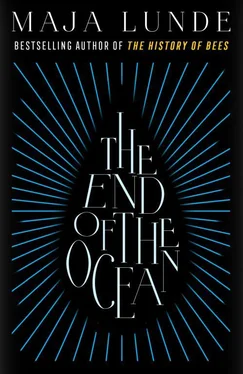“OK.”
She took the glass on the left. I took hold of the other.
“Do you know why you are given milk?” somebody suddenly said from behind us.
We turned around.
“Hi!” Lou said.
“Hi,” Marguerite said and nodded to her.
She had also just received her meal and held a bowl only a quarter full in her hands.
“Do you want to sit with us?” Lou said.
I scooted over a bit on the bench to make room for her.
But Marguerite didn’t move.
“You know that the milk is for the children?” she said.
I looked at the glass I had in my hand.
“No. I didn’t know that. Obviously.”
“That’s why you only received one glass. The rest of us don’t get any.”
“I see.”
I put my glass down on the table and quickly slid it over to Lou.
“Are they both for me?” she asked.
I nodded. Felt how the blood rushed to my face.
“The milk is for the children,” I repeated softly.
“But I don’t mind sharing,” Lou said.
“Thank you,” I said. “But it is apparently for you.”
I stared over at Marguerite as I said it.
She held her head tilted to one side, studying me, as if I were a stupid little man-child.
“ Happy now? ” I wanted to say, but stopped myself. It was better to keep my mouth shut.
“I don’t need two,” Lou said, and pushed the glass towards me again.
And I wanted milk, I did. No doubt it was cold, would cool my throat, my stomach. The only thing we received that was cold. So I took it. Quickly.
“You’re nice, Lou,” I said.
Marguerite emitted a tiny sound. I didn’t care. My daughter knew how to share, had learned to share. That meant something, anyway.
I took a sip of the milk. Waited for the coldness, but it had already had time to become lukewarm.
We’ve used up all the cold, I thought.
It was Marguerite’s fault. She poked her nose in without knowing anything about us.
August was only a year old. Lou had never really experienced having a sibling. A baby in the house didn’t count. A baby didn’t argue about sweets, a baby didn’t want to have the biggest piece of cake. All the same, or perhaps for that very reason, she was good at sharing.
“Have a seat,” Lou said to Marguerite.
“She probably wants to eat in peace,” I said to Lou.
“Why’s that?” Lou said to Marguerite.
Who sat down.
Or more precisely… took her seat. On the bench beside Lou, an appropriate distance away from her, like she wasn’t really with us.
Silence. I didn’t want to be the first one to speak…
But it was very quiet.
Perhaps I should say something.
She didn’t.
But none of the questions I was accustomed to asking— how’s it going, how about this weather, have you had a nice day —was appropriate, somehow.
What do you talk about in a refugee camp? How do you make small talk when your life has gone to hell?
And small talk… that wouldn’t hold any appeal for somebody like Marguerite.
She would just laugh at me.
No, she would smile, a crooked smile.
Best to avoid it.
I put my faith in Lou. She would succeed in lightening the mood. But she was too busy satisfying her hunger. She gulped down her food, even licked the bowl clean.
In the end it was actually Marguerite who broke the silence.
“They haven’t received supplies. That’s why there’s so little.”
“How do you know?” I said.
“I’ve been at a place like this before. In the mountains. That was the first thing that happened, the supplies stopped arriving.”
“The first thing that happened before what?”
“Before we all left.”
“It will be fine,” I said hollowly.
I didn’t want to have this conversation with her while Lou was listening.
“I haven’t seen a single vehicle come to the camp. Neither yesterday nor today,” Marguerite said.
“You’ve been sitting by the side of the road all day keeping an eye on things,” I said and tried to laugh. “Wasn’t it really hot? Did you sit by the edge of the ditch or something?”
She took a bite of her food and didn’t reply, didn’t even grace me with a glance.
“You’re quite the optimist,” I said.
I regretted the words immediately and hastened to add: “We are fine here. You can tell, can’t you, that this is a decent place?”
As if any of us knew whether this was a decent place. It wasn’t like she had all the answers, like she was the one who knew how things were at every single refugee camp in southern Europe.
For a while we were silent and finally Lou piped up.
“We found a boat.”
“A boat?” Marguerite said.
“Not really,” I said. “There was no boat, it was just a game.”
“But there was a boat,” Lou said. “There is a boat. It’s big and blue or black. Is it blue or black, Daddy?”
“Dark blue,” I said. “But it’s just a game.”
“Tell me about it, then,” Marguerite said and looked at Lou. “Even if it’s only a game.”
And Lou told her. About the boat, about the pirates, the dolphins and the shrewd captain.
Marguerite scooted over on the bench, closer to Lou, listened, asked more questions and Lou explained. They chattered away as if they were old friends.
And Marguerite laughed, she actually laughed, when Lou told her about the stupid sailor.
There they sat, the two of them, on the bench across from me, laughing at me. I wasn’t sure how I felt about that.
But afterwards, when we went our separate ways, Marguerite reached her hand out to Lou, towards her head, like she was going to ruffle her hair. She held it there stiffly, suspended aloft for a second, before pulling it back, and instead just gave the child a slight pat on the shoulder.
That was something, I thought. That, and that she had laughed.
Iwake up suddenly, the cold yanks me awake, my teeth are chattering and the sun has disappeared. The sky is clouding over and the wind has changed, become stronger, the boat is heeling more. I sit up; this must have blown up quickly. Or perhaps I’ve slept longer than I should have—me, the one who never needs an alarm clock at sea. I have always relied on my built-in timepiece.
All around me there is only the ocean, the only thing in sight is an oil platform, all lit up against a darkening sky. Every day they bring up two million barrels of oil, two million barrels. One barrel is 159 liters; I don’t have the energy to work out the total number of liters that comes to, every single day. There they are, all those who are constructing Norway, the nation, while simultaneously they are destroying the world. What if they said no, all of them, refused to work, went on strike? One single week would have helped, just one day would have helped, two million barrels fewer pulled up out of the ground and released into the environment.
The lights on the platform grow sharper all the time… no, it’s the surrounding world that’s growing darker, it must be late. The night is surprisingly dark for the bright month of April. I sail into the night, a strong wind from the east drives me away from land.
I take out the wind meter, hold it up, and measure the wind speed, fourteen meters per second.
Fourteen. Such strong winds already.
*
The wind is blowing harder and harder. I must reef the sail, rolling back an edge of the canvas to reduce the width. I should have done so a long time ago, but first I have to pee, so I do it quickly on the floor of the cockpit—it will be washed away immediately anyway. Then I adjust the wind vane and slowly release the headsail sheet. The sail flaps as if possessed; I grasp the line of the roller-furling system—it’s thin, chafes at my hands, I tug and haul at it but it’s too heavy, far too heavy, I’m not as strong as I used to be.
Читать дальше










